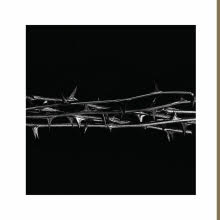Belgium’s Amenra have existed for more than two decades and over that period have gradually grown in stature and renown. Between 2003 and 2017, they released six albums entitled Mass I – Mass VI and concurrently rose to prominence as one of the most highly respected “post-metal” bands on the planet. The band are also known for their powerful and ritualistic live shows which, for example, have sometimes involved frontman Colin H. van Eeckhout being suspended in the air via meat hooks pierced through his skin.
De Doorn, Amenra’s seventh full-length, represents several changes for them. It is their first album (a) without a Mass-based title (De Doorn translates as “the thorn”), (b) with entirely Flemish lyrics, (c) to feature the vocal contributions of Oathbreaker’s Caro Tanghe (who is seemingly now a full band member) alongside van Eeckhout’s, (d) released on Relapse Records and (e) with new member Tim De Gieter on bass.
Reductive terms like “post-metal” are invariably inadequate. That is certainly the case with De Doorn. The record’s focus seems to be on generating atmosphere and mood, with the nuts and bolts of the music being secondary to this aim. Maybe it is post-metal, or maybe it’s just powerful atmospheric music. Either way, the soundscapes are epically cinematic, whether they are based around soft ambience or monolithic sludge riffs. De Doorn is full of the sort of music that has the power to make time stop and to draw a crowd into a sort of spiritual communion. It is enchanting and meditative. There is also a pervasive sadness here that feels universal, as though humanity’s collective grief and sorrow is being channelled into this cathartic ritual. On the other hand, the themes are no doubt very personal to the band. As if to underline this juxtaposition of universal and personal, many of the vocals (which I do not have translation for) are delivered in an intimate spoken word fashion, with the dry and direct sound contrasting with the vastness of the surrounding music.
The album is very consistent in terms of atmosphere, and there are certain musical running themes: tempos are always on the slow side, and many of the sections are allowed to repeat and gradually build over long periods so as to become internalised like meditative mantras. Beyond that, the music moves through various different expressions. There are hardcore-inspired screams; there are black metal-influenced textures; there is noise and glitchy effects; there are huge sludge sections; there are extended periods of ambience. During the really heavy parts the sound is sometimes augmented by post-production distortion effects that make it feel like your speakers are about to blow. There is also a strong element of folk music. On many occasions the music breaks down so as to mainly consist of just clean guitar and vocals, and Tanghe’s voice often adds delicate and tender melodies or textural harmony as the guitar plays repeated melancholy patterns that feel timeless. Similar folky clean guitar ostinatos also appear over the top of even some of the most crushingly heavy sections. These folk elements — and, apparently, the lyrical approach — are influenced by Kleinkunst, a European folk-based musical movement.
De Doorn is a difficult album to write about; verbal descriptions don’t do it much justice. It is undeniably heavy but it also incorporates many different sounds and styles in order to convey its deep emotional message. It is a very cohesive record that really needs to be heard from start to finish. It is an intense experience. You need to immerse yourself in it and breathe along with its ebb and flow. Doing so won’t necessarily put a smile on your face, but you are likely to feel cleansed and a little lighter afterwards.
De Doorn is out now on Relapse Records. Find it on vinyl, CD, cassette, and digital download here.
For more from Alternative Control, find us on Facebook, Twitter, Instagram, Soundcloud, and bandcamp.
Plus, follow our 2021 coverage playlist on Spotify! #nogarbagetracks
Enjoying our content? Support the site on Ko-fi and Patreon!

